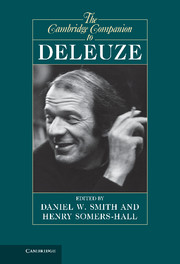Book contents
- Frontmatter
- Contents
- Contributors
- Abbreviations
- Introduction
- 1 Deleuze and the history of philosophy
- 2 Difference and Repetition
- 3 The Deleuzian reversal of Platonism
- 4 Deleuze and Kant
- 5 Phenomenology and metaphysics, and chaos
- 6 Deleuze and structuralism
- 7 Deleuze and Guattari
- 8 Nomadic ethics
- 9 Deleuze’s political philosophy
- 10 Deleuze, mathematics, and realist ontology
- 11 Deleuze and life
- 12 Deleuze’s aesthetics of sensation
- 13 Deleuze and literature
- 14 Deleuze and psychoanalysis
- 15 Deleuze’s philosophical heritage
- Bibliography
- Index
- References
Introduction
Published online by Cambridge University Press: 05 December 2012
- Frontmatter
- Contents
- Contributors
- Abbreviations
- Introduction
- 1 Deleuze and the history of philosophy
- 2 Difference and Repetition
- 3 The Deleuzian reversal of Platonism
- 4 Deleuze and Kant
- 5 Phenomenology and metaphysics, and chaos
- 6 Deleuze and structuralism
- 7 Deleuze and Guattari
- 8 Nomadic ethics
- 9 Deleuze’s political philosophy
- 10 Deleuze, mathematics, and realist ontology
- 11 Deleuze and life
- 12 Deleuze’s aesthetics of sensation
- 13 Deleuze and literature
- 14 Deleuze and psychoanalysis
- 15 Deleuze’s philosophical heritage
- Bibliography
- Index
- References
Summary
Gilles Deleuze belongs to that group of philosophers, often taken to typify the continental approach to philosophy, for whom the difficulty we encounter in reading them is not simply one of the content of their claims and arguments, but also one of penetrating their style of writing itself. This difficulty is exacerbated by the fact that Deleuze not only seemingly employs language in order to destabilize and obfuscate his philosophical arguments, but also revises his basic philosophical terminology between his numerous writings, from the early work of intensive depth, virtuality, and pre-individual singularities, to the body without organs, machinic phylum, and plane of immanence of his collaborations with Guattari. This leads us to the problem of how we read Deleuze. Do we see the obfuscation of language, the various appropriations of the sciences, and the experiments in philosophical writing as attempts to cover over a paucity of argumentation? Do we take up this rejection of traditional metaphysical language, seeing it as a rejection of the tradition of metaphysics itself, or do we strip the language away in the hope of finding underneath it a philosophical position that can be distinctly expressed in another, more palatable language? Similarly, we might ask what the reason is for the proliferation of philosophical systems developed by Deleuze, both in his historical monographs and his own philosophical writings. The continual reinvention of basic philosophical concepts might be taken to signal a failure of Deleuze’s philosophical enterprise, an inability to formulate a definitive yet consistent philosophical outlook. Finally, Deleuze presents us with the problem of understanding the relation of these various projects. Deleuze’s engagements with the history of philosophy, science, aesthetics, and ethics seem reminiscent of the kind of grand systematic project of the nineteenth century exemplified by the works of Hegel. In spite of this similarity, there is a repetition of themes, and a recommencement of philosophical projects that is more akin to what we find in Schelling or Nietzsche. While Difference and Repetition and the Logic of Sense, for instance, were written at much the same time, they provide very different approaches to the questions of ontology and metaphysics.
- Type
- Chapter
- Information
- The Cambridge Companion to Deleuze , pp. 1 - 12Publisher: Cambridge University PressPrint publication year: 2012
References
- 1
- Cited by



